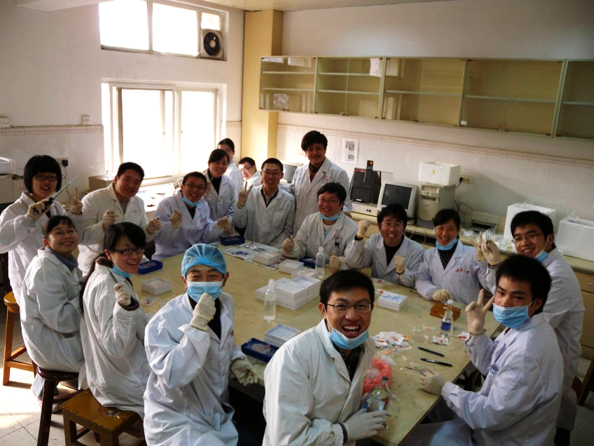
HUI WANG, M.D.,PH.D
E-mail Address: wanghui19@whu.edu.cn
Office Address: 185# DongHu Road, Wuhan, Hubei, 430071
Position(s): Professor
Affiliation(s):Department of Pharmacology
Research interests / Specialties:
1. Xenobiotic developmental toxicology
2. Drug target and new drug development
Education and Training
Medical Degree 1981 – 1986 Hubei Medical University, China
M.S., 1988 – 1991 Hubei Medical University, China
Ph.D., 1996 – 1999 Hubei Medical University, China
Research Description
My group’s work is mainly focused on xenobiotic developmental toxicology, drug target and new drug development. We have systematically demonstrated the phenomenon that prenatal xenobiotics (i.e. caffeine, nicotine, ethanol and dexamethasone) exposure increases susceptibility to chronic adult diseases (i.e. metabolic diseases and mental disorders) in offspring and firstly proposed the mechanism of “intrauterine neuroendocrine metabolic programming”. We also identified some target organs, susceptible genes and biomarkers that indicates developmental toxicities. Our study provides research basis for elucidating intrauterine programming mechanism of xenobiotic’s developmental toxicities and relevant long-term detrimental effects, addressing international academic hot issue “developmental origin of health and diseases (DoHaD)” and exploring effective clinical strategy for prevention and treatment.

Publication List:
1. Li J, Luo H W, He Z, Zhang L, Guo Y, Ma L, Magdalou J, Chen LB, Wang H*. Gender-specific increase in susceptibility to metabolic syndrome of offspring rats after prenatal caffeine exposure with post-weaning high-fat diet. Toxicol Appl Pharmacol, 2015; 284:345-53
2. Xu D, Bai J, Zhang L, Shen L, Wang LL, Liu ZF, Xia LP, Wang H*. Prenatal nicotine exposure-induced intrauterine programming alteration increases the susceptibility of high-fat diet-induced non-alcoholic simple fatty liver in female adult offspring rats. Toxicol Res 2015; 4 (1):112-20.
3. Wen YX, Li J, Wang LL, Tie K, Magdalou J, Wang H*, Chen LB*. UDP-glucose dehydrogenase modulates proteoglycan synthesis in articular chondrocytes: its possible involvement and regulation in osteoarthritis. Arthritis Research & Therapy 2014; 16(6):484.
4. Kou H, Liu Y, Liang G, Huang J, Hu J, Yan YE, Li X, Yu H, He X, Zhang B, Zhang Y, Feng J, Wang H*. Maternal glucocorticoid elevation and associated blood metabonome changes might be involved in metabolic programming of intrauterine growth retardation in rats exposed to caffeine prenatally. Toxicol Appl Pharmacol. 2014;275(2):79-87.
5. Zhang C, Xu D, Luo HW, Lu J, Liu L, Ping J, Wang H*. Prenatal xenobiotic exposure and intrauterine hypothalamus-pituitary-adrenal axis programming alteration. Toxicology. 2014;325C:74-84.
6. Feng JH*, Yan YE, Liang G, Liu YS, Li XJ, Zhang B J, Chen LB, Yu H, He XH, Wang H*. Maternal and fetal metabonomic alterations in prenatal nicotine exposure-induced rat intrauterine growth retardation. Mol Cell Endocrinol. Accepted. Mol Cell Endocrinol 2014;394(1-2):59-69.
7. Ping J#, Wang JF#, Liu L, Yan YE, Liu F, Lei YY, Wang H*. Prenatal caffeine ingestion induces aberrant DNA methylation andhistone acetylation of steroidogenic factor 1 and inhibits fetaladrenal steroidogenesis. Toxicology 2014; 321:53-61.
8. Yan YE, Liu L, Wang JF, Liu F, Li XH, Qin HQ, Wang H*. Prenatal nicotinic exposure suppresses fetal adrenal steroidogenesis via steroidogenic factor 1 (SF-1) deacetylation. Toxicol Appl Pharmacol, 2014;277:231-41.
9. Kou H, Liu Y, Liang G, Huang J, Hu J, Yan YE, Li X, Yu H, He X, Zhang B, Zhang Y, Feng J, Wang H*. Maternal glucocorticoid elevation and associated blood metabonome changes might be involved in metabolic programming of intrauterine growth retardation in rats exposed to caffeine prenatally. Toxicol Appl Pharmacol. 2014;275(2):79-87.
10. Luo H, Deng Z, Liu L, Shen L, Kou H, He Z, Ping J, Xu D, Ma L, Chen L, Wang H*. Prenatal caffeine ingestion induces transgenerational neuroendocrine metabolic programming alteration in second generation. Toxicol Appl Pharmacol. 2014; 274(3): 383-92.
11. Shen L, Liu ZF, Gong J, Zhang L, Wang LL, Magdalou J, Chen LB, Wang H*. Prenatal ethanol exposure programs an increased susceptibility of non-alcoholic fatty liver disease in female adult offspring rats. Toxicol Appl Pharmacol, 2014; 274(2): 263-73.
12. Qin J, Shang L, Ping AS, Li J, Li XJ, Yu H, Magdalou J, Chen LB*, Wang H*. TNF/TNFR signal transduction pathway-mediated anti-apoptosis and anti-inflammatory effects of sodium ferulate on IL-1beta-induced rat osteoarthritis chondrocytes in vitro. Arthritis Res Ther, 2012;14(6): R242.
13. Xu D#, Wu Y#, Liu F, Liu YS, Shen L, Lei YY, Liu J, Ping J, Qin J, Zhang C, Chen LB, Magdalou J, Wang H*. A hypothalamic–pituitary–adrenal axis-associated neuroendocrine metabolic programmed alteration in offspring rats of IUGR induced by prenatal caffeine ingestion. Toxicol Appl Pharmacol, 2012;264(3):395-403.
14. Xu D, Zhang BJ, Liang G, Ping J, Kou H, Li XJ, Xiong J, Chen LB, Magdalou J, Wang H*. Caffeine-induced activated glucocorticoid metabolism in hippocampus causes hypothalamic-pituitary-adrenal axis inhibition in fetal rats. PloS ONE. 2012;7(9):e44497.
15. Liu YS, Xu D, Feng JH, Kou H, Liang G, Yu H, He XH, Zhang BF, Chen LB, Magdaloue J, Wang H*. Fetal rat metabonome alteration by prenatal caffeine ingestion probably due to the increased circulatory glucocorticoid level and altered peripheral glucose and lipid metabolic pathways. Toxicol Appl Pharmacol. 2012;262:205-16.


